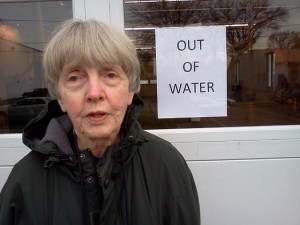Spill Lesson: “Protecting Clean Water Is Not a Luxury”
From the Article by Dan Heyman, WV Public News Service, January 13, 2014
CHARLESTON, W.Va. – Many West Virginians have decided that the lesson from the Freedom Industries chemical spill is to better protect their water from pollution. For years, the state has seen legal and political battles between industries and citizen groups over clean water rules.
While waiting in line for bottled water this weekend, Marilyn McGeorge of Charleston said she believes the accident showed clear signs of widespread negligence – not just by the company, but by regulators as well.
“The Department of Environmental Protection should have been aware that with that tank poised above the water supply, this was something that could happen very easily,” McGeorge said.
According to Angie Rosser, executive director, West Virginia Rivers Coalition, people tend to regard environmental and water quality rules as luxuries – something that can be bent to allow economic development. She said that is proving to be dangerous.
“Protecting the environment is really protecting our quality of life. We just had the 40th anniversary of the Clean Water Act. Yet we still, every day, permit industries to pollute directly into our drinking water sources,” Rosser pointed out.
The accident shows that the regulatory attitude needs to change, she added.
“Clean water is essential for life. This kind of a harmful, toxic chemical, with such close proximity to a drinking water source for over 300,000 West Virginians, is just unacceptable,” she said.
In the past, state officials have described water protections as sufficient, or even excessive. McGeorge said the accident should also make people think differently about cases in which local residents have had their well water polluted by coal mining or natural gas fracking.
>>>>>>>>>>>>>>>>>>>>>>>>>
WASHINGTON POST EXCERPT – - -
West Virginia residents cope, with days of water woes still ahead after chemical spill
From an Article by Joel Achenbach, Washington Post, January 12, 2014
CHARLESTON, W.Va. — Around the swollen Elk River, now flowing with a chemical that’s hard to pronounce, myriad streams and rivulets tumbled from the hillsides over the weekend, the result of a drenching downpour. Logs and branches floated downstream, toward the junction with the Kanawha in the heart of the city. Potholes on the beat-up country roads had turned into deep puddles.
As they say: Water, water everywhere, but not a drop to drink.
“DO NOT USE WATER,” say the signs taped over sinks at the airport, and in the State Capitol the sinks are entirely wrapped in plastic bags. People line up for free water at the fire stations or buy it at the Dollar General — $1.60 for a 20-ounce Dasani, $39 for a flat of 24 bottles.
A chemical used in coal processing has leaked from an old tank along the Elk and invaded the water supply, a crisis that has affected nearly 300,000 people in nine counties and effectively closed the largest city in the state. You can’t drink the water, bathe in it or do laundry with it. It’s good only for flushing.
Monday will mark the fifth day of the water emergency, which began early Thursday when people all over town registered a powerful odor like black licorice. Two state employees tracked the leak to Freedom Industries, which owns a row of vintage storage tanks along the south bank of the Elk. The chemical had leaked from an inch-wide hole in the bottom of one tank, pooled in a containment area and then seeped through a porous cinder-block retaining wall, down the bank and into the river.
The public water supply inlet was just a short distance downstream.
URL for Washington Post cartoon is here.
>>>>>>>>>>>>>>>>>>>>>>>>>>>
CHARLESTON GAZETTE EXCERPT – - -
State ignored plan for tougher chemical oversight
From an Article by Ken Ward Jr., Charleston Gazette, January 12, 2014
Three years ago this month, a team of federal experts urged the state of West Virginia to help the Kanawha Valley create a new program to prevent hazardous chemical accidents.
The U.S. Chemical Safety Board recommended the step after its extensive investigation of the August 2008 explosion and fire that killed two workers at the Bayer CropScience plant in Institute.
Since then, the proposal has gone nowhere. The state Department of Health and Human Resources hasn’t stepped in to provide the legal authority the Kanawha-Charleston Health Department needs to start such a program. And Kanawha County officials never funded the plan, and seldom mention that the CSB recommendation was even made.
Now, with more than 300,000 residents across the Kanawha Valley without usable water following a chemical accident at Freedom Industries on the Elk River, some local officials say it’s time for action. “We’d had their recommendation on the books for several years now,” said Dr. Rahul Gupta, director of the local health department. “This gives us another opportunity to look at what they recommended.”


{ 1 comment… read it below or add one }
Another Chemical Found in Elk River after Recent Massive Spill
January 21, 2014 By: WSAZ News Staff
CHARLESTON, W.Va. (WSAZ) — Another chemical was found in the Elk River after the massive spill that happened Jan. 9 and led to a several-day water usage ban for more than 100,000 West Virginia American Water customers in parts of nine counties.
The chemical is called PPH and is used in conjunction with the MCHM that already had been identified. MCHM is used to clean coal, and PPH makes it even more fluid.
State Homeland Security officials learned the information Tuesday morning after Freedom Industries, the company responsible for the leak, handed over some documents.
The chemical has not been detected in tests that have been conducted by the U.S. National Guard.
This latest round of testing will continue. At this point, officials say no new water bans or restrictions have been put into place as a result of this new information.
From http://www.WSAZ.com